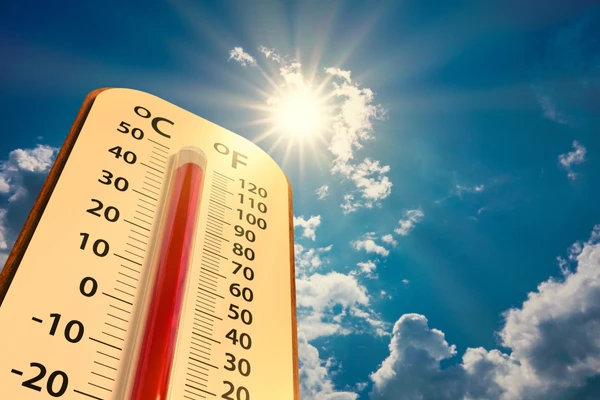Recently, the Heat Index reached 50°C in Delhi and might touch 56°C.
About Heat Index:
- Heat Index (HI), also known as Apparent Temperature, is a measure of how hot it really feels when relative humidity is factored in with the actual air temperature.
- The India Meteorological Department (IMD) has launched the Heat Index on an experimental basis.
Color codes used for HI:
- Green: HI less than 35 °C
- Yellow: HI between 36-45 °C
- Orange: HI between 46-55 °C
- Red: HI greater than 55 °C
Factors determining the Heat Index include:
- Relative humidity: the amount of water vapor present in air expressed as a percentage of the amount needed for saturation at the same temperature.
- Air temperature
- Dew point: the temperature at which air can no longer hold all its water vapor, and some of the water vapor must condense into liquid water.
Calculation and Impact
- The Heat Index formula was published by Dr. Robert Steadman in 1979. His study considered an adult human of either sex, with a height of 1.7 meters and a weight of 67 kg, and used 14 °C as the dew point in the calculations.
Impact of Heat and Humidity:
- Hot air can hold more moisture than cold air. As temperatures rise, the air’s ability to hold moisture increases, affecting the heat index.
- High humidity can prevent the body from effectively dissipating excess heat, leading to heat stress.
- Symptoms of heat-related stress include increased heart rate, heat-related exhaustion, rashes, and other symptoms. If not addressed, these issues can be fatal.
- The body cools itself by sweating, but in high humidity, sweating becomes less effective because the air is already saturated with moisture.
International Comparisons
- Some countries, like Canada, have introduced their own unique heat index measurements, such as Humidex.
- The United States National Weather Service (NWS) uses a specific chart to determine the heat index, showing that higher relative humidity increases the risk of heat-related illnesses.
Ref: Source
| UPSC IAS Preparation Resources | |
| Current Affairs Analysis | Topperspedia |
| GS Shots | Simply Explained |
| Daily Flash Cards | Daily Quiz |


